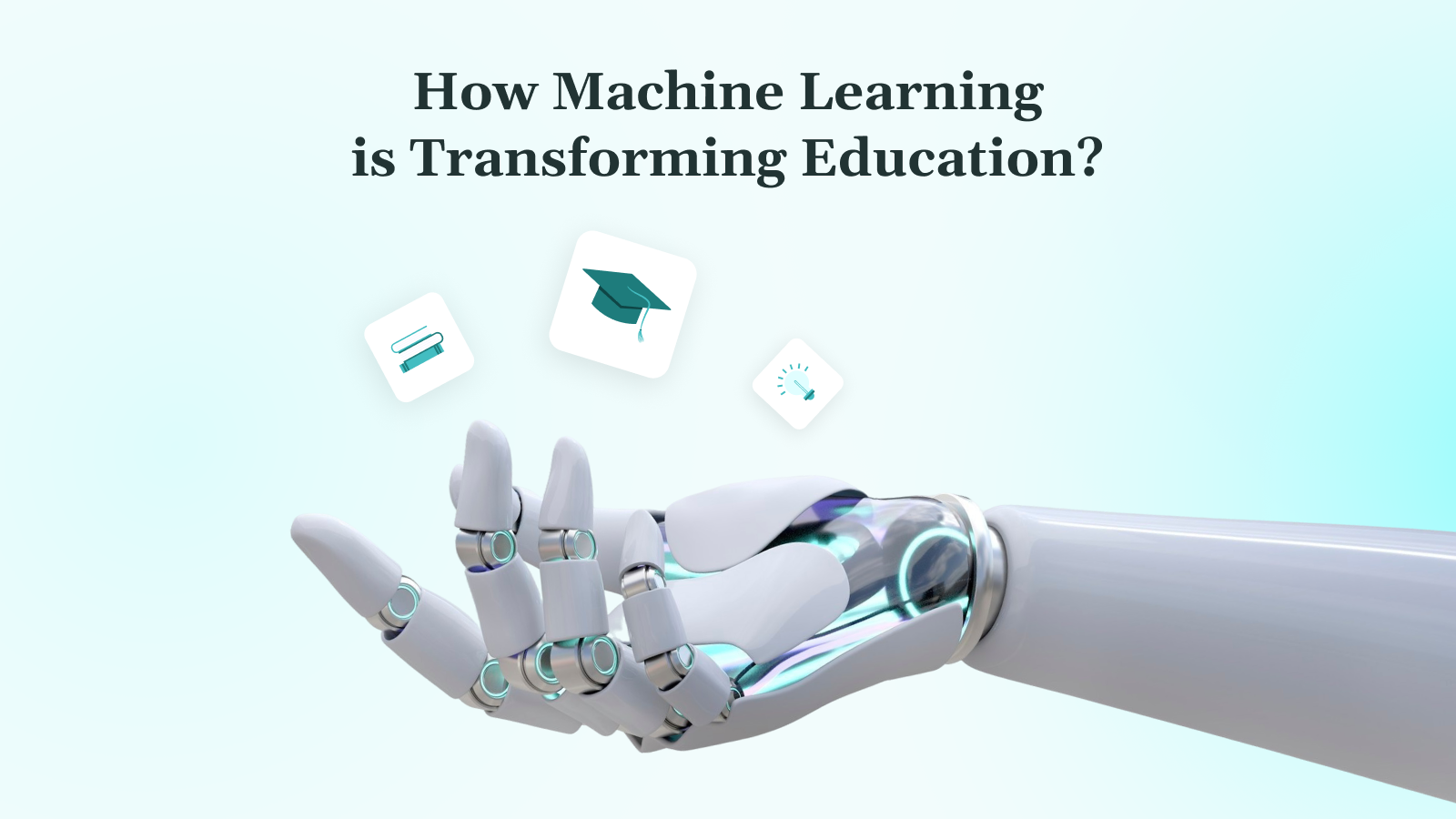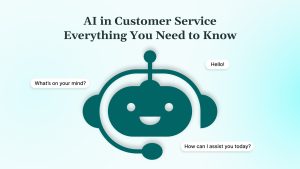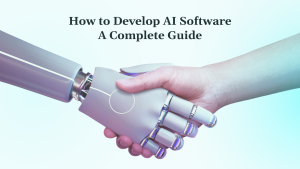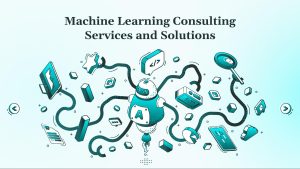Education is evolving, not just in how it is delivered, but in how it responds. From personalized learning paths to predictive student performance tools, the shift is not just digital, it is intelligent.
At the center of this shift is machine learning, not as a buzzword, but as a practical tool for solving real problems: identifying knowledge gaps faster, adapting content in real time, and improving how institutions manage data, feedback, and outcomes.
What is changing is not just the classroom; it is the entire educational ecosystem. This blog covers how machine learning is reshaping education, where it is headed, and why the right technology decisions now will define what learning looks like tomorrow.
Key Takeaways
- Machine learning is reshaping education by enabling real-time feedback, adaptive content delivery, and data-driven decision-making for both educators and learners.
- AI-powered assistants and personalized learning platforms are becoming essential for delivering scalable, inclusive, and effective education.
- Neuroadaptive technologies, like eye tracking and biometric feedback, are emerging to further enhance focus, retention, and learner engagement.
- Corporate learning programs are rapidly adopting adaptive training systems for workforce development and upskilling.
- DEVtrust enables the future of learning by delivering custom-built EdTech platforms with AI/ML capabilities, seamless backend integration, and scalable cloud architecture.
- Real-world results, like in EdTech AI and MoeenMed, show measurable improvements in efficiency, engagement, and learning outcomes through smart, AI-driven systems.
Understanding Machine Learning’s Role in Education
Machine learning is not just improving education; it is changing how it works at every level. By identifying patterns in student behavior, performance, and engagement, ML algorithms allow systems to respond in real time, adapt learning materials, and guide interventions. The result: smarter support for learners, educators, and institutions alike.
According to recent market analysis, machine learning in the education sector was valued at $1.82 billion in 2021, and it is expected to grow at a CAGR of 36% through 2030. The momentum is real, and the applications are already transforming how we learn.
Early Detection of Learning Challenges
- ML-driven platforms can detect deviations in student performance, attention, or engagement that may signal learning difficulties.
- By identifying patterns that may go unnoticed in traditional classroom settings, schools can intervene early with personalized support.
- These systems are especially beneficial in high-volume or remote learning environments where manual tracking is limited.
Personalised and Adaptive Learning Paths
- Algorithms analyze real-time data to tailor content, adjust pacing, and recommend resources based on a learner’s profile and progress.
- This moves beyond static curricula, allowing each student to engage with material at the optimal difficulty level and speed.
- Educators are able to allocate more time to strategic instruction, coaching, mentoring, and critical thinking, rather than repetitive delivery.
Predictive Analytics to Drive Institutional Decisions
- Predictive models assess dropout risk, academic success probabilities, and learner sentiment based on behavioral and demographic inputs.
- Administrators can refine course offerings, allocate resources, and deploy targeted engagement strategies based on forecasted trends.
- Such analytics contribute directly to improving retention rates, program efficacy, and overall institutional performance.
Applications in K–12 Education
- Machine learning is used to identify both academic risks and socio-emotional concerns with measurable accuracy.
- These tools enable schools to adapt interventions, ranging from lesson modifications to parental outreach, before issues escalate.
- ML also supports operational tasks such as attendance tracking, identity verification, and campus safety through intelligent automation.
Enhancing Higher Education and Research
- Universities are using ML for enrollment forecasting, grant allocation decisions, and academic performance monitoring at scale.
- In research, ML accelerates hypothesis testing, data interpretation, and knowledge discovery, especially in multidisciplinary domains.
- Institutional efficiency is further improved via intelligent scheduling systems, chatbot support, and automated grading.
Powering the Next Generation of EdTech Platforms
- ML is foundational to EdTech innovation, driving core features such as:
- Conversational AI (e.g., student-facing chatbots and virtual tutors),
- Recommendation engines for content and learning pathways,
- Natural language processing for grading, summarisation, and translation,
- Voice and speech technologies for accessibility and engagement.
- These capabilities enhance both the learner experience and the platform’s business intelligence.
At DEVtrust, we specialize in building scalable cloud platforms and backend architectures for EdTech and academic institutions. From Firebase and OpenAI integrations to real-time analytics pipelines, we help education-focused teams implement ML-powered systems that are fast, secure, and built for scale.
8 Key Benefits of Machine Learning in Education
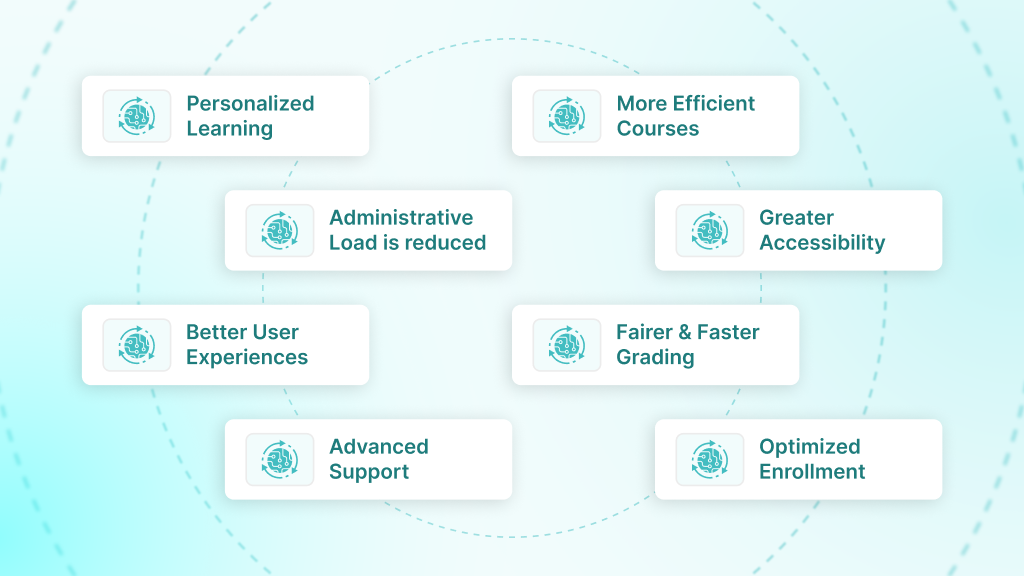
Machine learning is not just enhancing education; it is rebuilding the framework around how students learn, how teachers teach, and how institutions operate. From personalized instruction to smarter administration, the gains are both practical and measurable.
Here are the most impactful ways machine learning is transforming the education experience:
1. Personalized Learning at Scale
Traditional classrooms are built around averages. Machine learning flips that model, adapting content in real time based on how each student learns, interacts, and progresses. Algorithms analyze behavior, performance, and pace to recommend the right material at the right moment.
Instead of teachers stretching to meet 30 different learning styles, machine learning systems do the heavy lifting, delivering tailored content paths, real-time feedback, and differentiated instruction, all without extra overhead.
2. Smarter, More Efficient Courses
By tracking time spent on topics, click paths, quiz results, and interaction patterns, ML algorithms reveal exactly where students struggle and excel. That data does not sit idle; it powers adjustments. Students can be routed to additional resources when they are stuck or fast-tracked when they show mastery.
The result? Streamlined courses that adjust in real time and make better use of every learner’s time.
3. Lighter Administrative Load
Educators do not just teach; they manage onboarding, grading, scheduling, reporting, and compliance. Machine learning automates these repetitive tasks with precision. Attendance tracking, progress notifications, and performance summaries are handled behind the scenes, freeing educators to focus on high-value instruction and mentorship.
Explore DEVtrust’s backend services and API integration expertise to automate workflows and reporting across learning platforms, making education delivery smoother at scale.
4. Greater Accessibility for Global Learners
Language shouldn’t be a barrier to learning. Machine learning systems with built-in natural language processing (NLP) capabilities can transcribe, translate, and adapt course material across multiple languages with accuracy, opening access to students across regions and demographics.
This enables institutions to expand their reach without multiplying content creation costs.
5. Better User Experiences Across Roles
For students, learning becomes intuitive and engaging. For teachers, course management becomes more precise. For administrators, data reporting becomes real-time and actionable. That is the ripple effect of machine learning when implemented well; it improves the day-to-day experience for every stakeholder.
From enrollment to grading to help-desk support, ML allows for more responsive systems and fewer bottlenecks.
6. Fairer, Faster Grading and Assessments
Manual grading introduces the potential for bias and inconsistency. ML-powered grading tools apply consistent standards, flag anomalies, and speed up turnaround without sacrificing accuracy. These systems can also detect plagiarism and assess open-text responses with impressive reliability.
DEVtrust’s QA and AI/ML teams help education platforms maintain both accuracy and compliance, particularly in regulated domains like health sciences or licensure preparation, where precision is non-negotiable.
7. Advanced Support for Research Teams
In higher education, ML tools support large-scale research by extracting patterns from unstructured datasets, automating literature review through semantic search, and organizing depositories through clustering. Researchers spend less time digging and more time thinking.
8. Optimized Enrollment and Outreach
With machine learning, admissions departments can analyze behavioral data, engagement patterns, and historical trends to refine their outreach. The same predictive models help identify high-risk applicants or flag fraudulent entries, making enrollment both smarter and safer.
Machine learning is unlocking efficiencies that were not possible a decade ago. But the value does not come from throwing algorithms at the problem; it comes from targeted implementation backed by strong infrastructure.
That is why teams choose to work with partners like DEVtrust, bringing AI to life inside products that scale securely, integrate cleanly, and deliver lasting value.
Emerging Technologies Complementing Machine Learning in Education
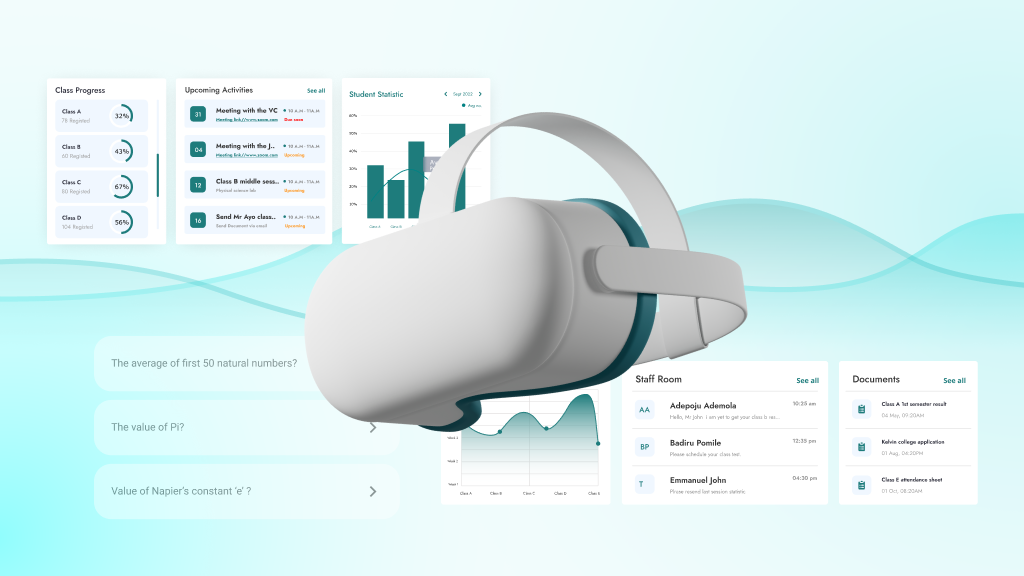
Machine learning has changed how we personalize content and track progress, but on its own, it is just one piece of a larger transformation. When paired with emerging technologies like augmented reality, IoT, blockchain, and advanced data analytics, it becomes part of an ecosystem that is reshaping the entire learning experience.
These technologies do not replace human instruction; they enhance it. Together, they make education more adaptive, interactive, and data-informed.
Augmented and Virtual Reality: Enabling Immersive Educational Models
Augmented reality (AR) and virtual reality (VR) technologies allow students to engage with complex subjects through multi-sensory experiences. These technologies, when integrated with machine learning models, deliver real-time adjustments in content delivery based on each student’s responses, engagement, and progress.
- Dynamic adaptation: Learning modules adjust visual content and pace based on individual comprehension levels.
- Behavioral analytics: ML tracks student interactions to identify weak areas and reinforce targeted concepts.
- Subject application: Especially useful in fields such as biology, architecture, history, and language learning, where spatial and experiential understanding deepens retention.
AR/VR backed by ML transforms passive learning into active exploration, making knowledge acquisition more intuitive and lasting.
IoT and Smart Learning Environments: Real-Time Contextual Awareness
The Internet of Things (IoT) introduces sensors and connected devices into the educational ecosystem, providing real-time data that enhances learning and teaching efficiency. Smart classrooms equipped with ML and IoT technologies can monitor learning conditions and behavioral patterns continuously.
- Environmental optimization: Sensors track factors like lighting, sound levels, and temperature to optimize focus.
- Engagement analysis: Wearables and smart devices assess attentiveness and fatigue, triggering automatic adjustments or alerts.
- Early interventions: ML algorithms analyze trends to suggest timely academic support, preventing learning loss or disengagement.
DEVtrust works with EdTech providers to design and deploy scalable, secure IoT-enabled learning platforms. These platforms are built with cloud-native infrastructure and privacy-first architecture, ensuring compliance, reliability, and operational continuity.
Blockchain: Modernising Credentialing and Academic Record-Keeping
Traditional academic record systems are siloed, slow, and often lack transparency. Blockchain introduces a decentralized, tamper-proof method for managing academic credentials and achievements.
- Self-sovereign identity: Students gain ownership of their learning records and can share them instantly across institutions or employers.
- Automation: Combined with ML, blockchain can update credentials dynamically as students complete modules or assessments.
- Auditability: Institutions benefit from enhanced transparency and reduced administrative overhead.
Blockchain integration in education promotes trust and mobility while streamlining institutional workflows.
Advanced Data Analytics: Turning Data into Strategy
While most educational systems generate large volumes of data, only those integrated with ML-powered analytics tools can translate this data into actionable insight.
- Performance diagnostics: Identify subject areas where students or cohorts are consistently underperforming.
- Resource recommendation: Automatically suggest personalized materials, exercises, or tutor sessions based on real-time behavior.
- Instructor support: Aggregate trends to inform teaching strategies, curriculum design, and pacing decisions.
DEVtrust enables educational organizations to build end-to-end analytics pipelines, backed by AI/ML capabilities and user-centric dashboards, that translate classroom data into measurable impact.
Robotics and Gamification: Scaling Engagement and Practice
Robotics, powered by ML, offers scalable and consistent interaction, especially in language learning, STEM education, and early childhood education.
- Responsive instruction: Robots adapt tone, speed, and complexity based on student responses.
- Practice reinforcement: They provide repetition-based learning in a non-judgmental, adaptive environment.
- Gamified learning paths: ML algorithms personalize game difficulty and reward systems to align with the learner’s pace and preferences.
Gamification combined with ML drives continuous progress while making the learning process enjoyable and effective.
Integrating Technology for Sustainable Educational Impact
The true value of these emerging technologies lies not in their novelty but in how they work together to address real educational challenges, inequity, disengagement, limited access, and slow personalization.
When used in combination with machine learning, these technologies contribute to an ecosystem where:
- Learning is adaptive and data-driven
- Assessment is continuous and non-intrusive
- Instruction is accessible and inclusive
Challenges in Machine Learning Adoption
Machine learning holds promise for transforming how students learn and how educators teach, but real-world implementation comes with its own set of friction points. Data-heavy systems, algorithmic decision-making, and unequal access expose the cracks in infrastructure, ethics, and readiness.
Data Privacy is not Optional
Machine learning runs on data. The more it has, the better it performs. But in education, this often means collecting sensitive student information, grades, behavioral trends, attendance records, and even device usage patterns.
Without strict safeguards, the risk of data misuse grows. Schools must adopt transparent policies that explain how data is collected, who has access, and how long it is stored. Encryption, consent frameworks, and compliance with regulations like FERPA and GDPR are not just best practices; they are non-negotiables.
Biased Algorithms Still Teach the Wrong Lessons
Machine learning does not invent its own logic; it mirrors the data it is fed. If historical student data reflects unequal access or systemic bias, algorithms can end up amplifying those same patterns. A course recommendation engine might steer some students away from advanced subjects not because of ability, but because of biased training data.
Fixing this takes more than patchwork. It requires diverse data sets, continuous model audits, and a commitment to fairness baked into development, not retrofitted post-deployment.
Infrastructure Gaps Hold Students Back
While some schools pilot adaptive learning platforms and real-time feedback engines, others still struggle with basic internet access. The result is a growing divide, where well-funded institutions move forward, and under-resourced ones fall further behind.
Closing that gap means building ML-powered tools that work across a wide range of environments, mobile-first, bandwidth-light, and infrastructure-flexible. DEVtrust’s backend engineering and cloud architecture teams focus on building scalable solutions that do not just perform in ideal conditions; they adapt to real ones.
Future Trends in Adaptive Learning and Machine Learning for Education
Machine learning is no longer a supporting feature in education; it is becoming the foundation for how learning is personalized, delivered, and optimized. From intelligent tutoring systems to real-time engagement analytics, the next wave of EdTech is already taking shape.
1. AI-Powered Learning Assistants
Today, AI assistants are more than simple chatbots. They:
- Offer personalized help based on individual performance
- Adapt explanations and learning pace in real-time
- Act as 24/7 study partners, accessible from any device
They are becoming a critical component of student support systems, especially in self-paced and hybrid learning models.
2. Neuroadaptive Learning
Neuroadaptive systems take feedback to the next level. By analyzing biometric inputs like eye movements or cognitive load, these tools can:
- Detect distraction and adjust content accordingly
- Dynamically modify learning difficulty based on focus and engagement
- Improve comprehension and retention through data-driven pacing
This tech is gaining traction in high-stakes environments, think medical training, aviation, or intensive STEM programs.
3. Adaptive Learning in Corporate Training
Machine learning is also transforming corporate learning:
- Courses adapt to employee skill levels and knowledge gaps
- Progress tracking enables precise performance feedback
- Teams receive role-specific upskilling, not generic content
It is a smarter way to keep teams aligned in fast-changing industries like finance, logistics, and healthcare.
How DEVtrust Builds the Future of Learning
Behind every intelligent learning platform is robust architecture, real-time analytics, seamless integrations, and scalable infrastructure. DEVtrust specializes in bringing that backbone to life.
Our teams design and deliver:
- Custom LMS platforms with built-in personalization engines
- AI-enhanced learning modules for curriculum creation, adaptive testing, and intelligent feedback
- Secure, scalable backends that support high concurrency and cross-platform access
We have already helped EdTech innovators turn these ideas into impact:
Case Study: EdTech AI, Smarter Learning for Schools
DEVtrust built a unified e-learning platform that uses AI to power curriculum design, student-teacher engagement, and performance tracking.
What We Delivered:
- A central dashboard to manage classes, registrations, and assignments
- AI-generated assessments and video content
- Real-time leaderboards and progress analytics
- AI-powered messaging and chat assistant for student support
Results:
- 35% increase in student engagement
- 40% boost in communication efficiency
- 25% improvement in learning outcomes
Case Study: MoeenMed, AI-Powered Clinical Note Automation
While designed for healthcare, MoeenMed reflects how adaptive technology can streamline any domain, including education.
What We Delivered:
- AI-based transcription using OpenAI and Nabla API
- Real-time SOAP note generation from physician-patient conversations
- HIPAA-compliant templates and data handling
- Automation that allowed professionals to focus on their core responsibilities
Results:
- 98% reduction in manual effort
- 97% improvement in document handling speed
- 92% increase in productivity
- 95% gain in user trust and system confidence
No matter if it is adaptive learning in schools or AI-powered automation in clinical settings, DEVtrust helps teams turn ambitious ideas into reliable, scalable solutions. As machine learning pushes education forward, we are here to build the tech that makes it possible.
Conclusion
Machine learning is doing more than enhancing education; it is redefining how learning is structured, delivered, and scaled. From personalized tutoring systems to real-time progress tracking, the focus is shifting toward experiences that are adaptive, intelligent, and outcome-driven.
But building systems like these takes more than theory. It takes the right tech stack, the right architecture, and a partner who understands how to translate innovation into impact.
At DEVtrust, we work with educational institutions and EdTech platforms to bring intelligent learning systems to life. Building a custom LMS, integrating AI-powered assessments, or looking to future-proof your platform with real-time analytics, we have done it.
Explore our EdTech capabilities orget in touch to start your project.
How Machine Learning is Transforming Education
Uncover how machine learning and education intersect to personalize learning, automate tasks, and enhance engagement. Unlock the future of education today!
Contact Us